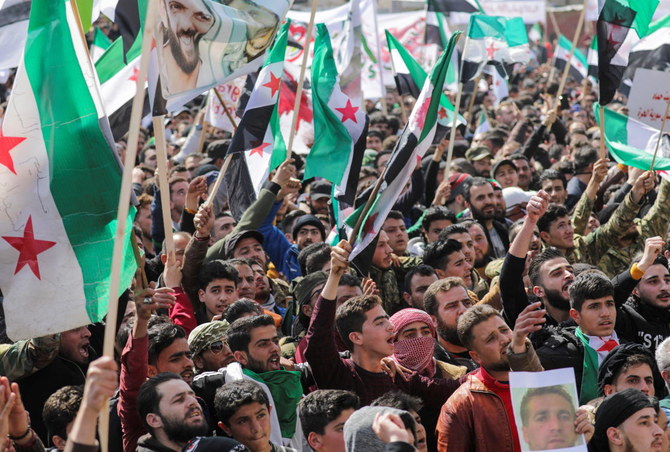IDLIB, Syria: Thousands took to the streets in Syria’s last major rebel bastion of Idlib Monday to mark 10 years since the nationwide anti-government protests that sparked the country’s devastating civil war.
In the extremist-dominated stronghold’s main city, crowds marched, some waving the opposition’s three-star flag or holding up images of those killed during the conflict.
“Freedom, freedom, freedom,” they sang in Idlib city, exactly as did the first protesters in 2011 demanding an end to President Bashar Assad’s rule.
“The people want the fall of the regime,” they shouted, echoing the slogan adopted by protesters elsewhere in the Arabic-speaking region in the spring of 2011.
One of those marching, Hana Dahneen, said: “We came to renew the pledge we made in 2011 when we decided to oust Assad.
“We had hoped to topple the regime from day one,” she said.
“But it unleashed all kinds of weapons against the innocent people to crush the revolution.”
Syria’s war has killed more than 388,000 people and displaced millions of Syrians inside the country and abroad.
But today Assad is back in control of more than 60 percent of the country after a string of Russia-backed victories against rebels and militants.
A decade on, Assad looks set to win a new presidential election this summer in regime-held areas.
Idlib, whose 2.9 million inhabitants have been protected by a cease-fire since March 2020, is one of the few key areas still holding out against the Damascus government.
“We will remain committed to our... revolution even if it takes 50 years,” Dahneen said.
As the conflict entered its 11th year on Monday, the head of the UN refugee agency looked back on what he said was “one of the largest refugee crises in modern times.”
“Ten years of the Syrian crisis have inflicted unimaginable human suffering and pain,” UNHCR head Filippo Grandi said.
“The world has failed Syrians,” he said, while acknowledging the huge efforts made to accommodate Syria refugees.
The war has displaced some 6.7 million people inside Syria, and almost 5.6 million Syrians abroad, mostly to neighboring countries, according to UN figures.
Endless rounds of UN-backed peace talks have failed to stem the bloodshed, and have in recent years been overshadowed by a parallel negotiations track led by Moscow and rebel backer Ankara.
Thousands rally in Syria’s Idlib to mark 10 years since uprising
https://arab.news/nurm7
Thousands rally in Syria’s Idlib to mark 10 years since uprising

- In the extremist-dominated stronghold’s main city, crowds marched, some waving the opposition’s three-star flag
- Syria’s war has killed more than 388,000 people and displaced millions
Israel police to deploy around Al-Aqsa for Ramadan, Palestinians report curbs

- The Al-Aqsa compound is a central symbol of Palestinian identity and also a frequent flashpoint
JERUSALEM: Israeli police said Monday that they would deploy in force around the Al-Aqsa Mosque during the Muslim holy month of Ramadan, which begins this week, as Palestinian officials accused Israel of imposing restrictions at the compound.
Over the course of the month of fasting and prayer, hundreds of thousands of Palestinians traditionally attend prayers at Al-Aqsa — Islam’s third-holiest site, located in east Jerusalem, which Israel captured in 1967 and later annexed.
Arad Braverman, a senior Jerusalem police officer, said forces would be deployed “day and night” across the compound, known to Jews as the Temple Mount, and in the surrounding area.
He said thousands of police would also be on duty for Friday prayers, which draw the largest crowds of Muslim worshippers.
Braverman said police had recommended issuing 10,000 permits for Palestinians from the occupied West Bank, who require special permission to enter Jerusalem.
He did not say whether age limits would apply, adding that the final number of people would be decided by the government.
The Palestinian Jerusalem Governorate said in a separate statement it had been informed that permits would again be restricted to men over 55 and women over 50, mirroring last year’s criteria.
It said Israeli authorities had blocked the Islamic Waqf — the Jordanian?run body administering the site — from carrying out routine preparations, including installing shade structures and setting up temporary medical clinics.
A Waqf source confirmed the restrictions and said 33 of its employees had been barred from entering the compound in the week before Ramadan.
The Al-Aqsa compound is a central symbol of Palestinian identity and also a frequent flashpoint.
Under long?standing arrangements, Jews may visit the compound — which they revere as the site of their second temple, destroyed by the Romans in 70 AD — but they are not permitted to pray there.
Israel says it is committed to maintaining this status quo, though Palestinians fear it is being eroded.
Braverman reiterated Monday that no changes were planned.
In recent years, a growing number of Jewish ultranationalists have challenged the prayer ban, including far?right politician Itamar Ben-Gvir, who prayed at the site while serving as national security minister in 2024 and 2025.














